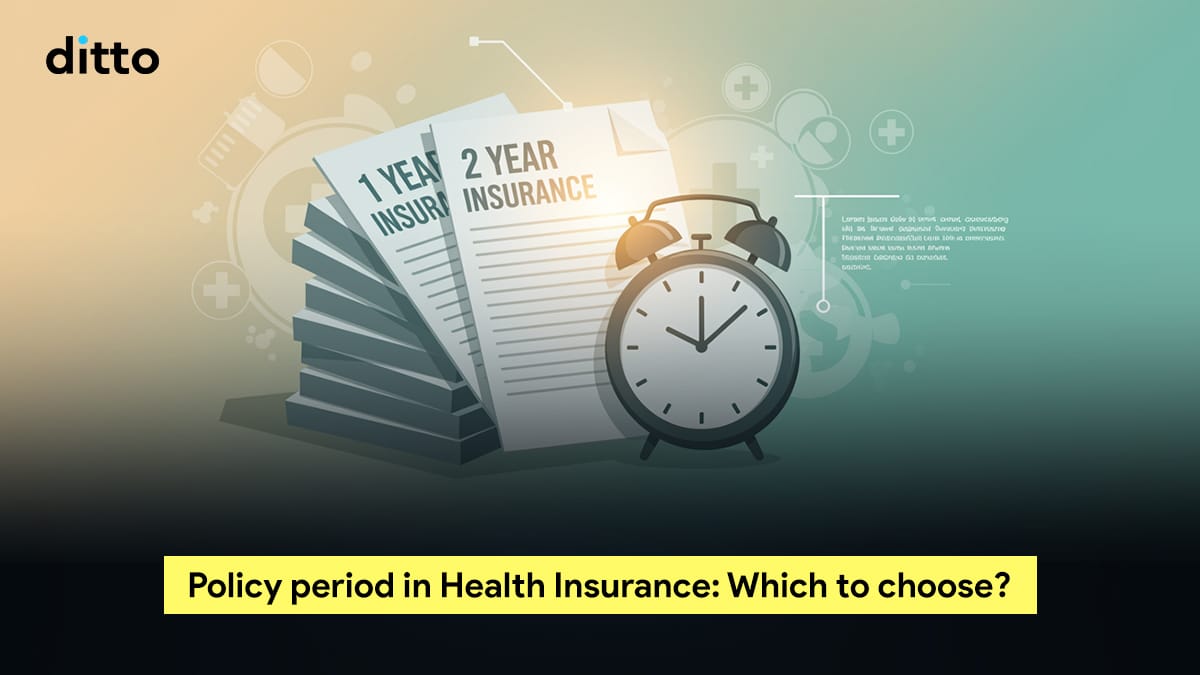| What is the Policy Period in Health Insurance? A policy period in health insurance refers to the set duration for which your health plan remains valid, starting from the policy start date and ending on the expiry date. During this time, you can use all the benefits promised in your plan and make claims for covered treatments. Most insurers offer flexible options, allowing you to choose a one-year plan or opt for multi-year policies (2-5 years) for convenience. Selecting the correct policy period not only ensures uninterrupted coverage but also helps you save premiums and reduce the hassle of frequent renewals. |
Have you ever thought about how long your health insurance really keeps you covered, and how that duration impacts your premium and savings? The policy period in health insurance decides how long your plan stays active, how much you pay, and how often you renew. Here's how picking the right term can help you save more.
Still unsure how to go about purchasing a personal health plan? Book a call with us, and let our experts guide you through the process.
Before moving forward, Let’s take a quick look at some of the leading health plans and their policy periods:
| Before we jump into the list, here’s how we decide what policies to feature. At Ditto, every plan goes through our six-point evaluation framework. It doesn’t mean these are the only good plans, but that they stand out after being scored across all six pillars. You can learn more about how we evaluate the plans here. |
| Plan | Policy Period Options | Key Benefits |
|---|---|---|
| HDFC ERGO Optima Secure | 1/2/3 years | PED WP: 3 years* Bonus: 50% PA up to 100% Restoration: 100% once a year** |
| Aditya Birla Active One Max | 1/2/3 years | PED WP: 3 years* Bonus: 100% PA up to 500% Restoration: 100% unlimited times |
| Care Supreme | 1/2/3 years | PED WP: 3* years Bonus: 50% PA up to 100%** Restoration: 100% unlimited times |
| SBI General Super Health Platinum Infinite | 1 / 2 / 3 / 4 / 5 years | PED WP: 2 years Bonus: Enhanced Cumulative Bonus (ECB)** up to 50% of the Base SI Restoration: Unlimited reinstatement; up to 200% SI per claim |
| Niva Bupa Reassure 2.0 Platinum+ | 1/2/3 years | PED WP: 3* years Bonus: Booster+: Carry forward unused cover up to 10x Restoration: 100% unlimited times |
| ICICI Lombard Elevate | 1 / 2 / 3 / 4 / 5 years | PED WP: 3* years Bonus: 50% PA up to 100% Restoration: unlimited no of times |
| STAR Super Star | 1 / 2 / 3 / 4 / 5 years | PED WP: 3* years Bonus: SI increases** by 50% each year Restoration: 100% unlimited times |
P.S.: *Can be reduced with add-ons; **Can be increased with an add-on
In this guide, we’ll explain what the policy period means, how it affects your premium, the typical options available, and the factors to consider before choosing one. Whether it’s for you or your family, knowing this can help you pick the right plan and save money in the long run.
| Did you know? According to the IRDAI Master Circular, insurers can now determine the duration for which they offer health policies, as the previous 3-year limit has been removed. In practice, we have seen most insurers offering plans with terms up to 5 years, which must continue under the same agreed-upon terms throughout the policy duration. |
How to Check the Policy Period of Your Health Plan?
Your policy period begins on the date your premium is received and the insurer approves the proposal, not the date you submitted the form.
To find your policy period:
- Check the “Policy Start Date” and “Policy End Date” on your policy document or e-policy.
- You can also view these details anytime through your insurer’s website, mobile app, or email.
Knowing these dates helps you track your coverage and renew on time so you stay protected without any break.
How Does the Policy Period in Health Insurance Affect the Premium?
The policy period in health insurance plays a crucial role in determining the amount you pay in premiums.
1) Short-term duration (1-year policy): With yearly renewals, your premium remains the same for that year, but may increase later due to age (annually by a small amount or insurers revise them when you move into a new age bracket, usually every 5 or 10 years) &/or medical inflation. Such policies are commonly offered by all insurers.
2) Medium duration (2–3 year policy): Choosing a more extended duration often comes with discounts of 5–15% when you pay upfront. It also locks in your premium, protecting you from yearly hikes and saving you money in the long run. Additionally, it eliminates the hassle of renewing your health insurance annually.
For instance, in the case of HDFC ERGO’s Optima Secure, the insurer gives a flat discount on the overall premium if you pay for multiple years in advance, i.e, 7.5% for a 2-year term and 10% for a 3-year term.
Meanwhile, in the Care Supreme plan, the discount is applied progressively each year. This means you get 7.5% off the premium in the second year for a 2-year policy. For a 3-year policy, you receive 7.5% off in the second year and an additional 10% off in the third year, resulting in growing savings over time.
3) Long term duration (4-5 year policy): Long-term health plans offer stability and savings. By paying a larger upfront premium, you enjoy discounts and lock in your rate for the entire policy duration. This protects you from annual premium hikes due to medical inflation, making long-term plans both cost-effective and hassle-free.
Plans such as ICICI Elevate, Star Superstar and Care Ultimate offer policy tenure up to 5 years.
Let’s take a look at the premiums for a 25-year-old, non-smoker male living in Delhi, insured for a sum of 15 lakhs:
| PLAN | 1 PAY | 2 PAY | 3 PAY | 4 PAY | 5 PAY |
|---|---|---|---|---|---|
| HDFC OPTIMA SECURE | ₹14,130 | ₹26,274 (Save ₹1,986) |
₹38,581 (Save ₹3,809) |
NA | NA |
| CARE SUPREME | ₹14,592 | ₹28,090 (save ₹1,094) |
₹41,224 (save ₹2,552) |
NA | NA |
| ADITYA BIRLA ACTIV ONE MAX | ₹10,149 | ₹19,797 (save ₹501) |
₹29,390 (save ₹1,057) |
NA | NA |
| ICICI ELEVATE | ₹12,212 | ₹23,880 (save ₹544) |
₹34,900 (save ₹1,736 ) |
₹45,920 (save₹ 2,928 ) |
₹54,051 (save ₹7,009 ) |
| STAR SUPER STAR | ₹10,307 | ₹20,128 (save₹ 486) |
₹28,955 (save ₹ 1,966) |
₹37,866 (save ₹3,326) |
₹46,568 (save ₹ 4,967) |
| Take Note: Choosing a longer period means uninterrupted accumulation of bonuses, potentially increasing your sum insured without additional premium hikes. |
What Are the Minimum and Maximum Durations for Health Insurance Policies?
When it comes to health insurance, the policy period determines how long your coverage remains active before it is renewed. Most insurers in India offer flexible durations to suit different needs.
- Minimum duration: Usually 1 year, which is the standard for most comprehensive health insurance plans. Some short-term covers (like travel or event-based policies) may last only a few days or months, but these are less common for long-term health needs.
- Maximum Duration: Retail health insurance can be renewed for a lifetime. However, each policy term is offered for a fixed duration, usually 1, 2, 3, or up to 5 years, after which it must be renewed to maintain the coverage. Upon renewal, you again get the choice of selecting the period/tenure you want.
| Point to be Noted: Suppose you pay the full premium upfront for a multi-year health policy. In that case, you can claim the entire amount as a tax deduction under Section 80D (old regime) in the same financial year. Alternatively, you can split the premium by the number of years the policy covers and claim the deduction proportionately each year. |
What Things to Consider When Choosing a Policy Period?
Choosing the correct policy period for your health plan depends on your lifestyle, financial situation, and personal plans. Let's take a look at some key points to keep in mind:
- Budget: Multi-year plans often come with discounts, but they require a larger upfront payment. Choose what fits your pocket.
- Flexibility: If you anticipate changes, such as a new job, relocation, or marriage, a 1-year policy may provide you with more flexibility to adjust.
- Renewal & bonuses: Longer terms reduce the hassle of yearly renewals and help you accumulate no-claim bonuses.
- Wellness rewards: Some insurers offer discounts or health-based rewards if you stay with a policy for multiple years.
- Medical inflation: A multi-year plan can lock your premium and protect you from yearly price hikes.
- Convenience: Longer policies mean less paperwork and fewer reminders to renew.
By balancing these factors, you can select a policy period that provides both savings and peace of mind.
How to Select the Ideal Policy Period for Your Health Insurance (Ditto’s Take)
A multi-year health insurance plan can be a smart move if your healthcare needs are steady and you’re happy with your insurer’s service and claims process. It lets you lock in your premium, stay protected from medical inflation, and skip the hassle of yearly renewals, saving both money and effort.
That said, flexibility is limited. Making changes to your plan, such as adding family members, updating riders, or switching plans (porting or migrating) mid-term, can be difficult. If you expect significant life changes soon, a 1-year plan may be more suitable, as it provides the flexibility to review and adjust your coverage as your needs evolve.
Why Talk to Ditto for Your Health Coverage?
At Ditto, we’ve assisted over 7,00,000 customers with choosing the right insurance policy. Why customers like Arun below love us:

✅No-Spam & No Salesmen
✅Rated 4.9/5 on Google Reviews by 5,000+ happy customers
✅Backed by Zerodha
✅100% Free Consultation
You can book a FREE consultation. Slots are running out, so make sure you book a call now!
Final Thoughts
Choosing the correct policy term for your health insurance plan is essential as it helps strike a balance between savings, flexibility, and long-term protection against medical inflation. Here are some key takeaways:
- Longer policy terms (2–5 years) offer premium discounts of 5–15% and protection from annual rate increases.
- Shorter tenured plans (1 year) provide flexibility for plan changes or upgrades.
- Multi-year plans reduce the hassle of renewals and ensure uninterrupted coverage.
- Upfront payment may be higher, but total savings are much greater in the long run.
FAQs
Can I change my policy period after I've purchased it?
No. You must choose the policy period (1-year or multi-year) at the time of purchase. You can change it only at renewal.
What if I forget to renew my policy?
Insurers usually allow grace periods, which are 15 days (for monthly premiums) or 30 days (for quarterly/half-yearly/annual premiums). Missing it may lead to a coverage lapse and loss of no-claim bonus & waiting period benefits.
Are multi-year policies cheaper?
Yes. They usually offer 5–15% discounts and protect against yearly premium hikes.
Can I cancel my multi-tenure policy?
Yes, you can cancel by providing the insurer with a notice. If no claim has been made, the insurer will refund the unexpired proportionate premium for that year and the remaining premiums for the following years in their entirety.
Do multi-year policies give tax benefits?
Yes. Under Section 80D, you can claim deductions proportionately for each year or claim it all at one in the current year.
Last updated on:










